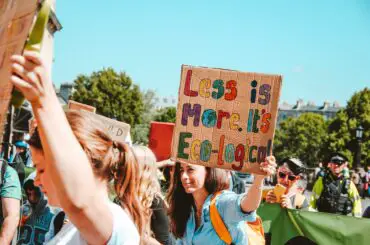Contents
- 1 Introduction
- 2 Why is the World Moving Towards Sustainability?
- 3 Environmental Impact
- 4 Social Responsibility
- 5 Economic Benefits
- 6 Renewable Energy
- 7 Sustainable Agriculture
- 8 Circular Economy
- 9 Green Technologies
- 10 Government Policies and Initiatives
- 11 Education and Awareness
- 12 Sustainable Cities
- 13 Climate Change and Sustainability
- 14 Corporate Sustainability Strategies
- 15 Challenges and Roadblocks
- 16 Conclusion
- 17 FAQs
Introduction
The call for sustainability has reached a crescendo in our rapidly changing world. It is no longer a niche concept but a pressing global issue that demands immediate attention. The very survival of our planet and its inhabitants hinges on our ability to embrace sustainable practices. But what exactly is sustainability?
Why is the World Moving Towards Sustainability?

Environmental Impact
Unsustainable practices have taken a toll on our environment. From deforestation to air and water pollution, our planet faces severe consequences due to human activities. The alarming rate of biodiversity loss and climate change indicates that immediate action is required. By adopting sustainable practices, we can minimize our ecological footprint and protect the delicate balance of nature.
Social Responsibility
Sustainability goes beyond just environmental concerns. It is deeply interconnected with social justice and human rights. Many vulnerable communities, especially in developing countries, bear the brunt of unsustainable practices. By prioritizing sustainability, we can address social inequalities, ensure access to basic necessities, and create a better quality of life for all.
Economic Benefits
Contrary to the misconception that sustainability is an economic burden, it actually offers numerous benefits for businesses and economies. By adopting sustainable practices, companies can reduce waste, optimize resources, and create more efficient operations. This leads to long-term profitability, cost savings, and enhanced brand reputation.
Renewable Energy
One of the significant advancements in sustainability is the rise of renewable energy sources. Solar, wind, hydro, and geothermal energy are rapidly replacing fossil fuels, reducing greenhouse gas emissions, and combating climate change. Embracing renewable energy is a crucial step toward a sustainable future.
Sustainable Agriculture
Agriculture is a vital sector that affects both the environment and society. Sustainable farming practices prioritize soil health, water conservation, and biodiversity protection. Promoting sustainable agriculture can ensure food security, reduce deforestation, and safeguard natural ecosystems.
Circular Economy

The concept of a circular economy aims to eliminate waste and promote sustainable consumption. Instead of the traditional linear “take, make, dispose” model, a circular economy focuses on reducing, reusing, and recycling resources. This approach minimizes not only environmental impact but also creates new economic opportunities.
Green Technologies
Innovation plays a pivotal role in driving sustainability forward. Green technologies, such as electric vehicles, energy-efficient buildings, and sustainable materials, are revolutionizing various industries. These advancements demonstrate that sustainability and technological progress can go hand in hand.
Government Policies and Initiatives
Government policies play a critical role in shaping sustainable practices on a national and international level. Governments can drive positive change by implementing regulations and incentives and encouraging businesses and individuals to adopt sustainable practices. International collaboration is essential to tackle global sustainability challenges effectively.
Education and Awareness
Promoting sustainability requires a collective effort, and education plays a vital role in creating awareness and fostering change. By integrating sustainability into educational curricula, we can empower future generations to become responsible stewards of the planet.
Sustainable Cities
As urbanization accelerates, the concept of sustainable cities becomes increasingly important. Eco-friendly urban planning, green infrastructure, and public transportation are vital to creating sustainable cities. These cities reduce pollution and enhance their residents’ overall quality of life.
Climate Change and Sustainability
The link between climate change and sustainability must be addressed. Climate change is one of the most pressing challenges of our time, and addressing it requires sustainable practices and policies. We can protect our planet’s future by mitigating greenhouse gas emissions and adapting to the changing climate.
Corporate Sustainability Strategies
Businesses significantly impact sustainability, and many companies are embracing corporate sustainability strategies. By integrating sustainability into their core values, businesses can achieve environmental and social goals while also ensuring long-term success.
Challenges and Roadblocks
Despite the momentum toward sustainability, some challenges must be overcome. Resistance to change, short-term thinking, and lack of resources pose obstacles on the path to sustainability. However, these challenges can be addressed through collective efforts and innovative solutions.
Conclusion
In conclusion, the world is moving towards sustainability because it is a matter of survival and responsibility. Embracing sustainability is not a choice but a necessity if we want to leave a habitable planet for future generations. By considering sustainability’s environmental, social, and economic aspects, we can create a balanced and thriving world for all.
FAQs

- Why is sustainability crucial for the planet?
Sustainability is crucial because it ensures that we meet our needs without depleting the planet’s resources, allowing future generations to thrive.
- How can individuals contribute to sustainability?
Individuals can contribute by adopting eco-friendly habits, reducing waste, supporting sustainable products, and advocating for sustainable policies.
- What role do businesses play in sustainability?
Businesses significantly impact sustainability and can drive positive change by adopting sustainable practices and prioritizing social and environmental responsibility.
- How does sustainable agriculture benefit society?
Sustainable agriculture ensures food security, conserves natural resources, and promotes biodiversity, creating a more resilient and sustainable food system.
- What are some challenges to achieving sustainability?
Challenges include resistance to change, limited resources, and the need for global cooperation, but addressing them is crucial for a sustainable future.
What is the Difference Between a Garbage Truck and a Dump Truck?





